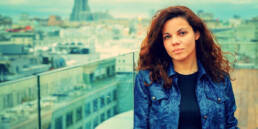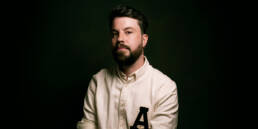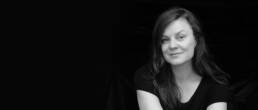
Songs of Earth is Margreth Olin’s critically acclaimed nature documentary which is both an intimate and an eye-opening experience. The director’s own father takes us on a breathtaking existential journey through the seasons of the vast Norwegian landscapes.
Described as ‘The cinematic nature experience of the year.’ and ‘A magnificent existential journey.’ by CPH:DOX, the film is already collecting accolades and is Norway’s Oscar submission.
By employing a unique scoring process, Rebekka Karijord crafted a beautiful symbiotic relationship between the sounds of nature and those produced by instruments.
Let’s talk about Songs of Earth by Margreth Olin, with whom you have a long-standing collaboration. How did you get involved in this project?
Yeah, 15 years it is now actually. I think I’m one of the first people she tells her ideas to and it has been like that for many years. Before she starts running a manuscript and applying for funding and all that. I think she told me about this idea in 2019. It was funny because we had done a bunch of documentaries together and she was supposed to do this big fiction film in Norway and every time we talked about it, because I was going to work on it too, it was a lot of resistance like, ‘Oh, that’s a problem.’ ‘And that’s a problem.’ And then we were sitting, having this meeting about it and were like, ‘How are we going to solve that?’ She hadn’t started filming. But then she was like, ‘You know, I have another project I’m thinking about.’ and then she really lit up. And she told me about Songs of Earth. And I was like, ‘Well, now something’s happening in your eyes. This is what you should do.’
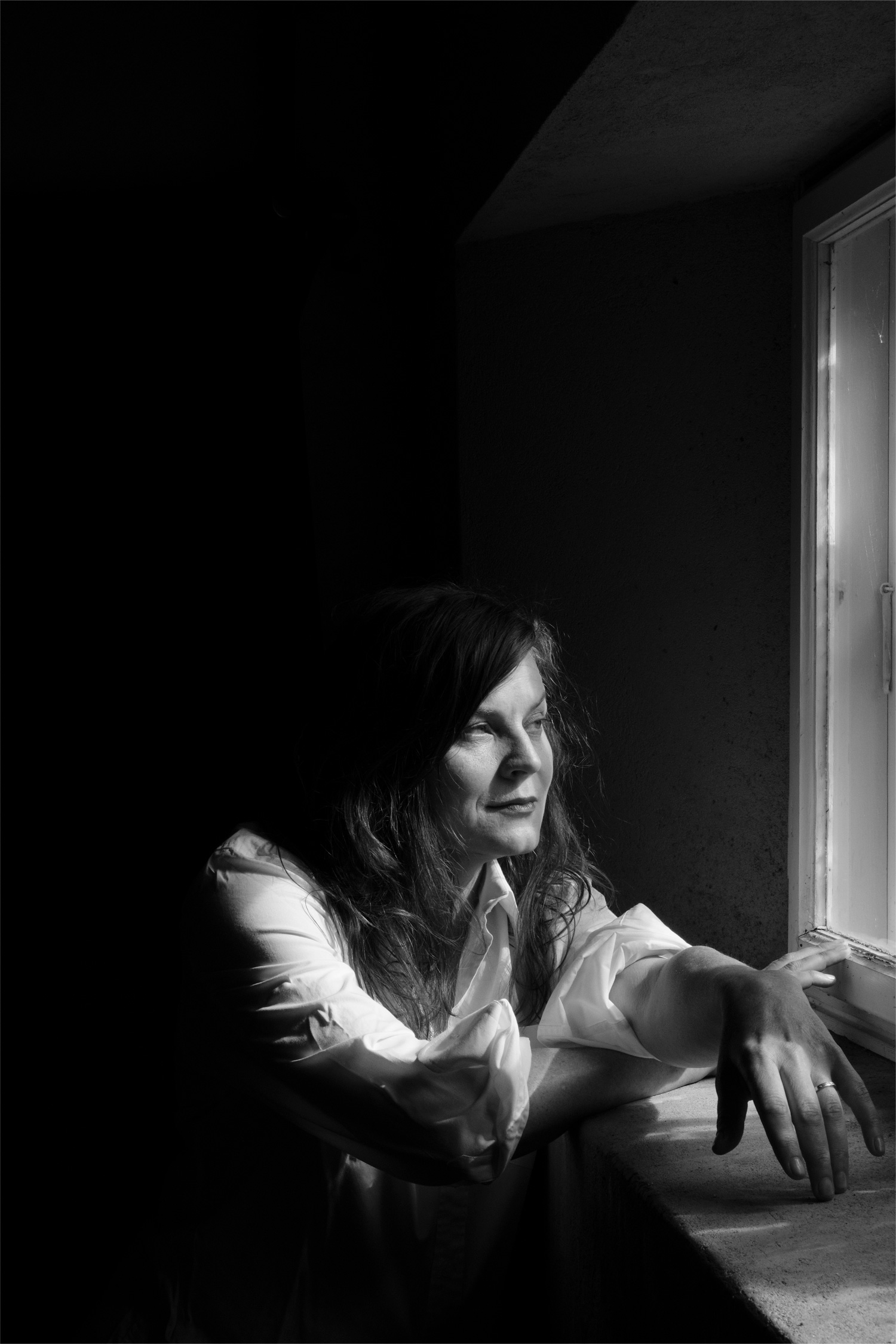 REBEKKA KARIJORD © KNUT BRY
REBEKKA KARIJORD © KNUT BRY
And then she actually jumped off that other film and started working, not because of me, but because I think a lot of people said to her, ‘This is a really good idea.’ So she started developing Songs of Earth quite fast after that and then COVID happened. They were filming and I couldn’t go to Norway – I live in Sweden, but I’m Norwegian – and I couldn’t go there myself to record sounds so I was in very close touch with the amazing sound team who was up with hydrophones in the water and contact microphones trying to put them on the glacier surfaces. They had all these different techniques that we were exploring and then they sent them to me and we made this big library of sounds from the valley.
And then I started orchestrating those trying to figure out: How would the spruce sound? Which instrument is that? Is it a woodwind instrument? Is it a brass instrument? Is it a string instrument? Is it a voice? How would the glaciers sound?
How did you make these decisions? Did you look at technical aspects such as tuning or tonality, or more like the materials the instruments had to be made of?
Both, I would say. Definitely a tonal register thing too, but I think it was also more intuition, more like, ‘What could this be?’ Because I’d never heard it or worked like that before. And then I made quite a few scores, but then I took a break because I got this big American film, which was the opposite of this process. It was like five weeks and a 90-minute full orchestral score and Hollywood and super-fast and crazy and everything was like ‘Argh!’.
I was like, ‘How do I go back to this slow pace?’. They had started editing then and Margreth was like, ‘Maybe you should meditate for a month before you start writing.’ [laughing] So I started meditating, actually. I contacted a friend of mine who is a meditation teacher and I meditated probably for a month, six weeks, and then I was like, ‘Now I got to start working, I got to really get into this.’ When I opened it again, everything came really fast.
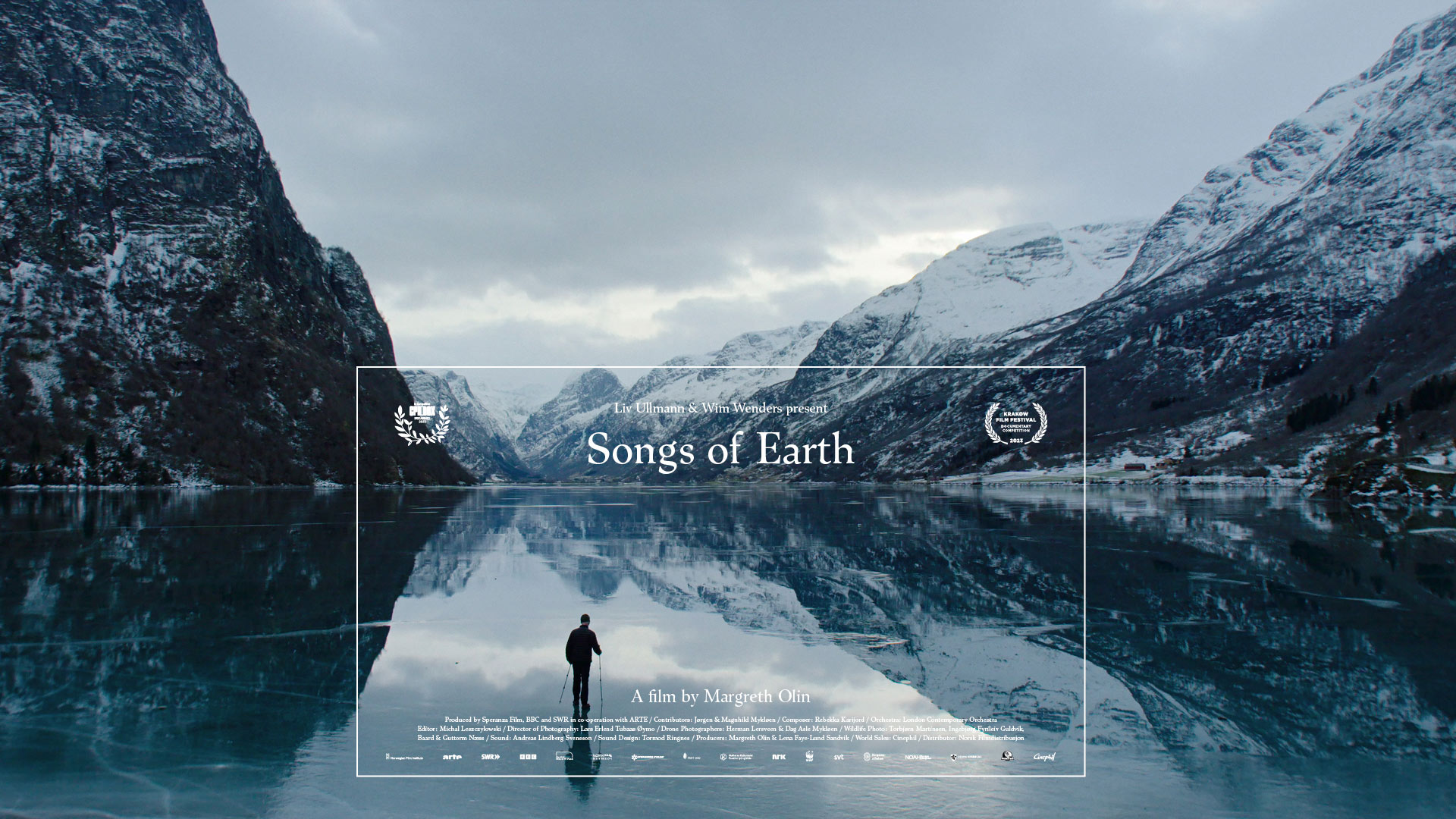 SONGS OF EARTH POSTER
SONGS OF EARTH POSTER
Then I took in soloists and I let them look at the sounds. I had some string players in, I had some singers in, I had some woodwind players, and I let them look at the scores, listen to the sounds, and then they looked at the footage. And together we improvised around the scores and then a lot of things fell in place because the soloists came with their own interpretation, and their own feeling and meeting the material. They had totally new eyes and ears for it. So, for example, I thought that the glacier would be a viola, maybe, and I thought maybe it would be some sort of woodwind instrument. Nils Berg, the woodwind player, had like a big palette of woodwind instruments with him – everything from bass clarinets to different various flutes to different saxophones – and we tried everything, and I was like, ‘Nah, it’s not quite right.’. And then he said, ‘Oh, I have an idea!’. He took the Alto flute and took the mouthpiece off and he blew it like a bottle. And it had this super moaning kind of incontrollable tone. Which was perfect for the melting glacier like this almost human voice. It’s a wind sound and it’s out of pitch a bit – it has its own pitch.
The violinist, Hanna Ekström, has a folk background. I didn’t think I wanted to go folky because I’m very afraid of the national romantic aspect of this nature in Norway. I was like, ‘I don’t want to go there.’, but then she had this way of twisting a melody that I wrote in so they really helped me find it, and honestly, that’s a lot how I work. I have a few people that I really trust and take in and they make my music a thousand times better.
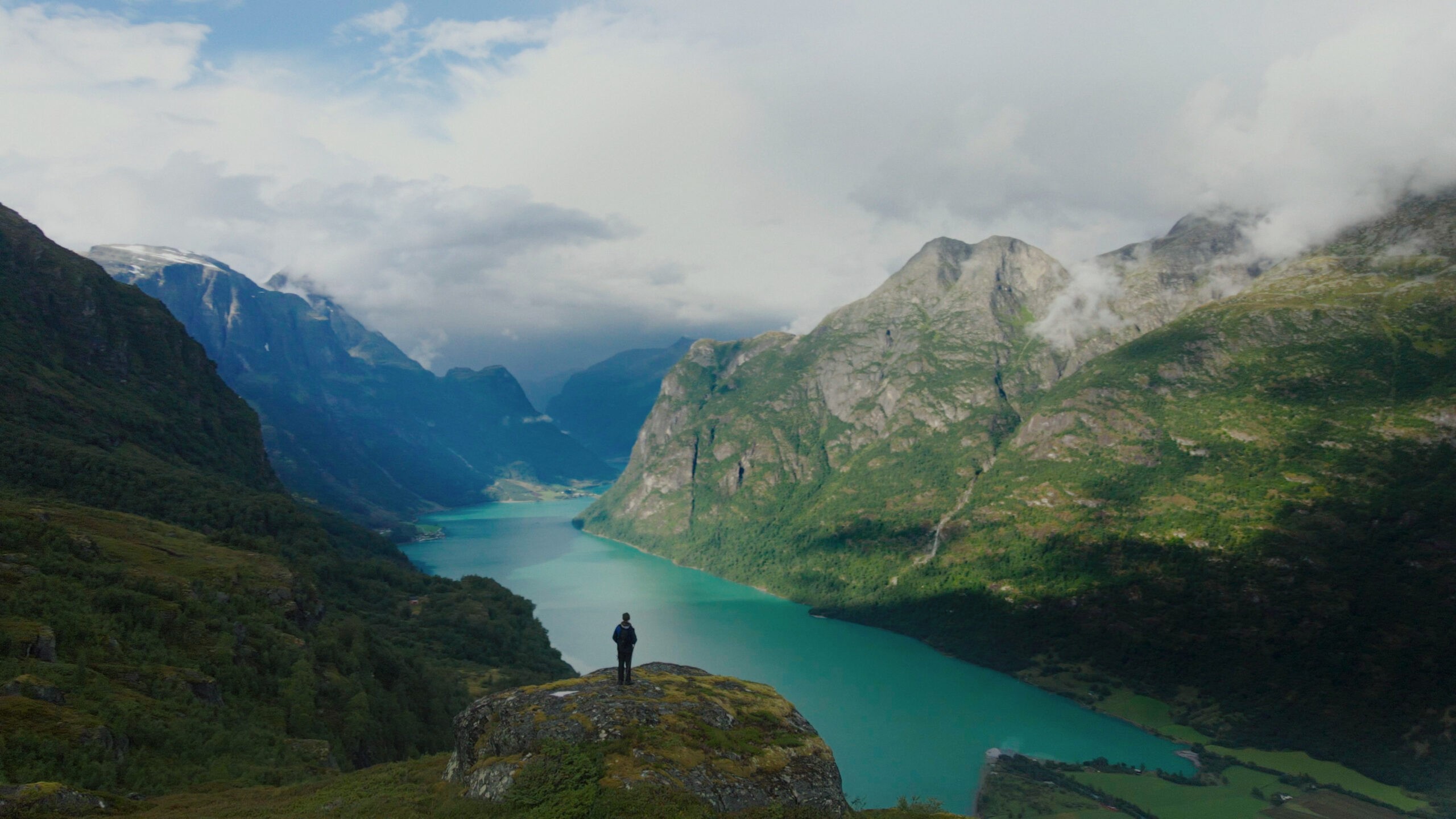 STILL FROM SONGS OF EARTH
STILL FROM SONGS OF EARTH
Had you seen any visuals beforehand or did you just start working from the field recordings?
No, I started working from the field recordings, but then once I was done meditating and I sat down they had cuts, some excerpts of seasons. I think I had like a part of the glacier, a part of the summer, a part of the fall. But honestly, what was written in those two, three weeks, maybe, after the soloists had been here, it was basically what Margreth wanted to use. She didn’t want to change much. And so, it was very easy. But it’s always easy for me to work with her. It’s a lot of trust and I didn’t find this film hard to score. It was almost like I was collecting something that was already there, you know?
The film seems to be highly personal to the director. How did you manage to empathize on that level with Margreth in order to create the exact soundscape that she desired?
I know her very well. She’s a friend too and she has a way of reaching my heartstring when she talks about her films. It always kind of happens in the beginning when we talk about her projects, I can sit by the piano and she tells me her story and then stuff comes very fast to me. And usually, I write it down or I sketch something immediately, which is a result of a long work relationship and a friendship and wordless intuitive artistic connection, I would say. Once you find that with a director as a film composer, hold on to it, because those are the relationships that really build up your artistic life and your career, I think. I’m not saying that in a strategic way, I’m saying it in a very heartfelt way. They’re so precious, those relationships.
And then I think also for me it’s a very personal film too. I grew up in that landscape further North. I live in Sweden now. I have two small kids and I relate to, maybe not the father’s story so much, but the love story for nature.
 STILL FROM SONGS OF EARTH
STILL FROM SONGS OF EARTH
And I’ve worked a lot on climate projects in the last years. I’ve scored the film about Greta Thunberg and I have done a record called Complete Mountain Almanac with the Dessner siblings last year, which is also a cyclic work following a year: 12 songs, one per month, about climate change and sickness.
I felt very moved by the material and the whole idea. With some projects you can just feel, ‘Okay, this is going to be something really special.’. And, also, to get to do music to a film where there’s hardly any dialogue and the music is so important and it’s a small budget. It’s, I don’t know, a million euros budget film, but almost 10% is used on the music and just that. That’s a privilege and trust from the director to say, ‘Okay, which orchestra do you want to work with?’. And she was extremely respectful and so it’s been great.
How did you find the experience of working with the London Contemporary Orchestra?
They’re amazing. They’re so professional, oh my God! And working with Hugh Brunt was fantastic. He’s the conductor who also co-orchestrated with me and Thomas Eggensberger, who’s my assistant. They are just really intuitive and flexible, I would say, because it is a lot of that with film scoring. If you think about the film scoring orchestra compared to a classical orchestra, it’s way less flexible with the classical orchestra, of course. You have to prepare and the score actually has to be exactly like it’s written and it’s a different language but a lot of us film composers are not classical composers. We are some sort of a hybrid. I’ve studied composition and orchestration, but I’m not a classical composer in that regard. I know the language, but it’s a different kind of communication in the studio which can be challenging if the orchestra is a little rigid or the conductor is stiff.
But with LCO it just felt they’re so open to last-minute changes and we did some really beautiful things where I did a lot of extra recordings at the end of the day that I wanted to give to the sound designer. For example, the sound of stones underwater in the waterfall in the beginning of the film, where there is this very hollow kind of almost repetitive sound of a certain rock that the water goes into and it sounds like a loop. They did this plucking with that and then we spread it out so it became like a stereo thing with a Decca Tree miking and it became really beautiful, like it moves around and we were kind of in real time like, ‘Okay, go there.’, and then, ‘You go there.’, and then, “you take up the dynamic there.’, and, ‘What happens if you go closer there?’. It was really amazing, really fun.
Have you discovered any interesting techniques during this process that you hadn’t used before?
Oh God, yeah. It was like school for me. That was one of the big motivations I think for me with the score. I got a chance to refresh and investigate extended techniques, on strings especially. There were a lot of sounds around the double bass that I discovered. And there is the sound on the ice towards the end of the film where I went down with a zoom recorder – I lived by the ocean too – and I really filmed the ice when it’s breaking in the spring and it’s three dimensions. It’s like one is the water on the top sizzling, and then there’s the middle which is like a mid-range cracking, and then underneath there is this amazing sub sound and then we divided that up. So, the double basses did something where they switched the bow backwards and they ran the backside of the bow over the bridge. Also, a lot of bowing just on the wooden body of the double bass, toneless. So yeah, it was amazing. Super fun.
Have you discovered any interesting techniques during this process that you hadn’t used before?
I think the most challenging part with orchestral scores is always the transition from the demos to the finished pieces. The Dogma rule, if you can say that, that Margreth and I had with this film was that every sound should stem from nature. So, this should never be manmade music just coming out of nowhere. Everything has to really grow out of the nature sounds so there was a very close collaboration between me and the sound designer, Tormod Ringnes, where I sent him my sounds and he sent his sounds to me. And in the end, I can’t really tell what is instruments and what is field recordings because it’s become this sound poem.
I think that was also a challenge, to find that balance. It was quite tricky. And he came at the very end when we were mixing and we got the recordings back from London, and of course, it’s at Air Studios, it’s a lot of players, almost 40 string players. And we were like, ‘Okay, how do we integrate this new sound into the intimacy?’ And so, what we ended up doing was keeping a lot of the initial soloist recordings, actually, because of that. And so, it was a little bit of, ‘Should we go that far and go really big and symphonic?’. ‘Yes, but we also have to keep some of this intimacy, to not lose the closeness.’ And, it is a documentary also, even if it’s big and spectacular. It also is a little poem about her mom and dad. So that was the trickiest part, I think, finding that balance.
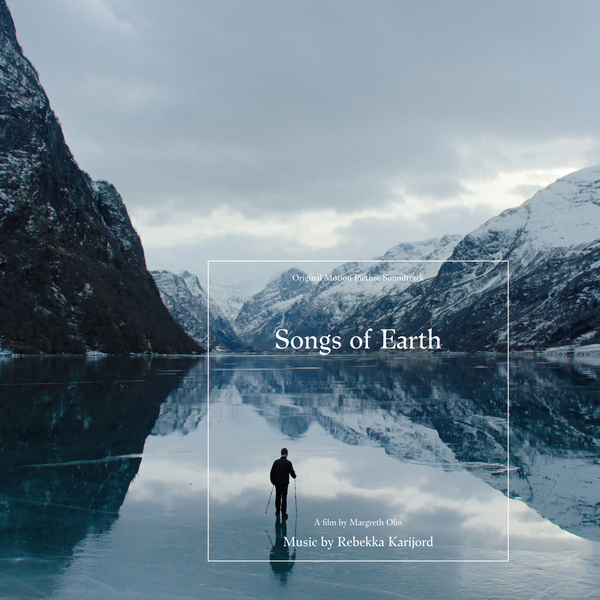
What can people learn from this film?
I think it’s very simple. It’s reminding us that we’re a part of this greater body, that we’re attacking. And if we take down that body, we’re taking down ourselves. And it’s a love story. It’s like a reminder to listen not only to nature but to yourself, too, to your instinct and your intuition and I think our instinct and our intuition tells us to not attack our own body, our own system. I think we’re wiser than that, just like animals, you know? But I think it is a reminder of what we are, what we’re made of, what our DNA with our cells are made of. Like those images of her father’s skin and the glacier, we’re all made out of the same stardust. It’s the same atoms and molecules and so I think that’s the biggest lesson from it. Remember what you are.
What exciting projects do you have coming up?
I am just finishing a Netflix drama series called Deliver Me, which is going to be airing this February or March, which is a beautiful, kind of dark drama series. And then I am scoring a Finnish-Swedish fiction film, which is set in the 30s up in Northern Sweden.
And then I have two other fiction films that are starting next fall. So, right now it’s a little break from documentaries, but I will always come back to that because my heart is there too, but I’m focusing on fiction films now for a while.
And I also just mixed a record with Roomful of Teeth, which is an American really awesome voice ensemble, which will come out next year. So, there’s a lot of nice things brewing.
Stella Lungu
Stella is the Editor-in-Chief of The Cinematic Journal. She is also the Managing Director of Wolkh, a PR, Marketing and Branding agency specializing in Film, TV, Interactive Entertainment and Performing Arts.
An Interview with Anna Drubich
Anna Drubich is a Russian-born composer of both concert and film music, and has studied across…
A Conversation with Adam Janota Bzowski
Adam Janota Bzowski is a London-based composer and sound designer who has been working in film and…
Interview: Giorgio Giampà on his approach to scoring The Good Mothers
Canneseries-winning composer Giorgio Giampà dialled in all the way from Guatemala a few weeks back…
Don't miss out
Cinematic stories delivered straight to your inbox.
Ridiculously Effective PR & Marketing
Wolkh is a full-service creative agency specialising in PR, Marketing and Branding for Film, TV, Interactive Entertainment and Performing Arts.
